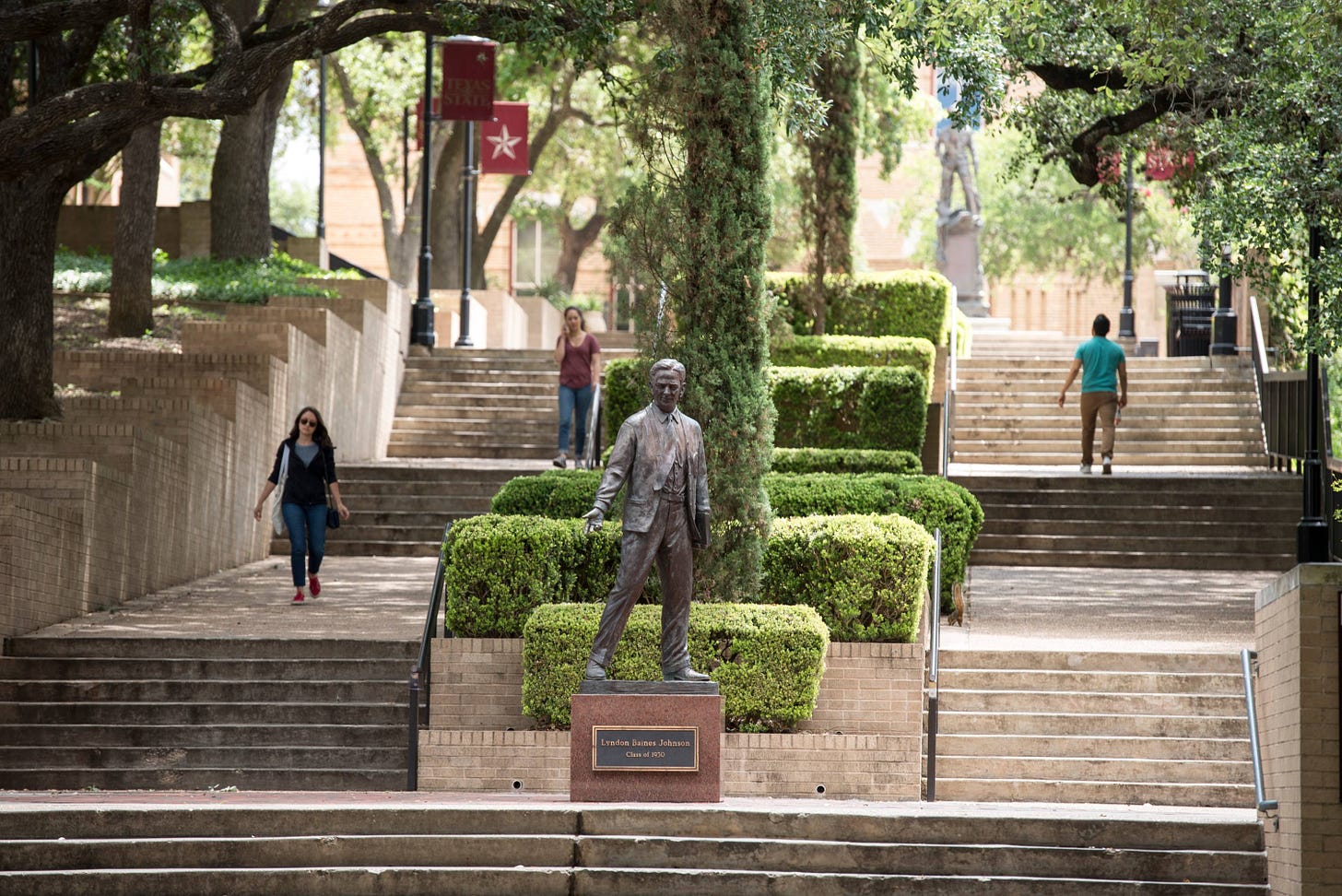How Eighty-One Dollars Made Lyndon Johnson
"Every time it came tuition-paying time, I would [just about] get evicted. ... It was seventeen dollars, and I just never did have the money." - President Lyndon B. Johnson
In 1927, future President Lyndon B. Johnson was about to drop out of college.
In The Path to Power, Robert Caro recounted how Johnson sat down to write a letter to his friend Ben Crider. As teenagers, the two had been a “two-man pick-and-shovel team” building a road in the dirt-poor Texas Hill Country. While Johnson enrolled at Southwest Texas State Teachers College at San Marcos, Crider moved to California and worked at a cement factory.
Johnson found ingenious ways to earn money on campus but struggled to live within his tight budget. He indulged in frequent haircuts, bought flamboyant clothes, and even a car. By 1927, he was ready to throw in the towel.
“I just can’t make it, and I’ve got to drop out,” he wrote Crider. College was supposed to be his ticket out of poverty, but he was “in debt forty-fifty dollars. And I got tuition time.” He had reached the end of his rope. “I want to come and get a job,” he pleaded. “Can you get me one?”
In California, Crider found himself with two letters: one from Johnson and a second one from Johnson’s mother who begged Crider “to encourage Lyndon to continue in school.”
Crider did what any good friend would do: he spoke to his supervisor and arranged a spot for Johnson. Then he sat down and wrote his reply:
Well, I can get you a job. Five dollars a day. I’ve talked to the superintendent, and he said I’ve got a job waiting for you.
“But,” he added, “I hope you won’t come.”
Crider had stopped by his bank and asked the teller how much money he had in his account — “the amount is recalled variously as $81 or $103 or $106,” Caro wrote. Whatever the figure, Crider withdrew it all ($81 would be about $1,464 today).
“They’re breathing this dust that goes into your lungs,” Crider continued in his letter, “and a lot of them are getting lung disease from it.”
I hope you don’t have a future like that, because it’s Hell out here. I’m sending you all the money I got in the bank, hoping that you’ll stay in college.
Those lines stunned me — and Johnson at the time.
“Eighty-one dollars!” Lyndon Johnson, reminiscing decades later, would recall. “I was the richest man on the campus! And I took that eighty-one dollars, and I paid all my debts, and I paid my next term’s bill.” — Path to Power
I pictured Crider returning to the cement plant, to a maze of pipes and conveyor belts and machines, to the noise and the sweat and the dust. I imagined him at the end of this shift, thinking of the money in his letter as it was crossing the country, hoping that his friend would do better.

Crider was one of many people who supported Johnson, yet this moment felt pivotal and unexpected. It seemed to reveal a truth about money.
Money with a capital ‘M’ — not currency, not coins — is a kind of social energy. It is like a current that only flows when people interact and exchange things of value. Until people use it, its energy lies dormant.
When we work hard and save money, we think we do it for ourselves. We worry about retirement, we plan to buy a house, we want to feel secure. But the most rewarding ways to use this energy will be opportunities that benefit others — the most gratifying investments will be the ones in people.
As Johnson’s example shows, even small amounts of money, shared with the right person at the right time, can change the course of history. If you doubt this, ask a working mom.
Years later, during the Great Depression, Johnson got Crider a job as an appraiser with the Federal Land Bank’s Houston office. “The best job I ever had,” Crider recounted.
The energy of Money is meant to be shared. You can’t predict what good can come out of it.
Frederik





What a great story that imparts timeless wisdom. Thank you Frederik. To think that Crider likely changed the course of history.
Nice